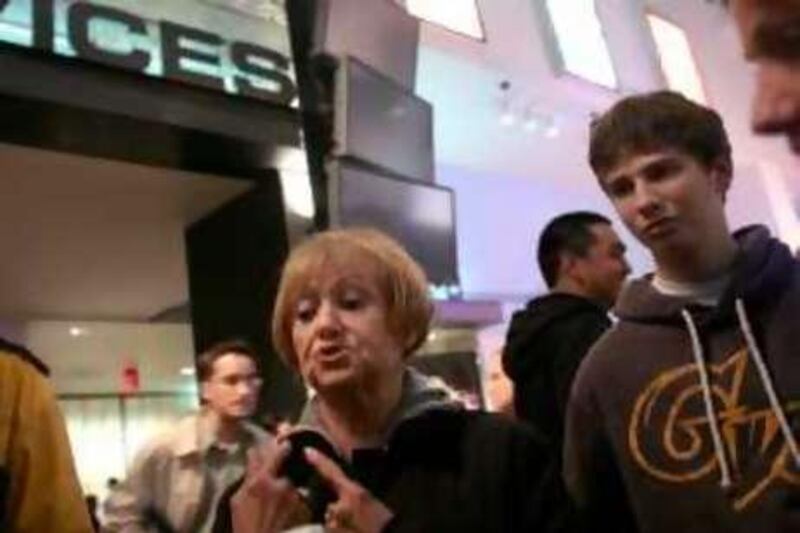WASHINGTON // The woman was so angry she said she almost spat. Her anger was not directed at Oliver Stone's cinematic portrayal of George W Bush but rather at eight years living under "W". W opened this weekend and is the first Stone film to examine a president still in office. Previous Stone films dissected John F Kennedy's assassination and Richard Nixon. "I'm so angry," said Carole after seeing W at a cinema in the Georgetown district of Washington, 10 blocks from the White House. "The movie was good and revealed a lot of what happened in the last eight years that I didn't really remember anymore."
Although the film was expected to generate controversy, it was released amid events that have overshadowed the film's main preoccupation - the war in Iraq. The Middle East has been unable to ignore the reverberations of Mr Bush's toppling of Saddam Hussein in 2003, but in the United States the president's record-low approval ratings have been mostly a result of the worst financial turmoil in the United States since the Great Depression.
Initial reviews of W have been lukewarm. The New York Times said the film offered little that was fresh on one of the most dissected presidencies in history, with Mr Bush already subjected to almost forensic examination in countless articles and books as well as such films as Michael Moore's Fahrenheit September 11, a sharp critique of the rush to war and the biggest box-office success in the genre.
"I think many Americans are feeling uneasy because they gave their support to Bush as he led us into the disastrous war in Iraq because of the September 11 attacks," one moviegoer said. "W probably won't do well just like other films about Iraq didn't succeed because people don't like to be reminded of that." W received only a smattering of applause in the Georgetown movie house, perhaps reflecting some unease among a Washington audience - which included many involved in public affairs during Mr Bush's eight-year leadership - with the almost soap opera-like treatment of recent events.
Although Mr Bush's policies have polarised US residents over the wars in Iraq and Afghanistan and the larger "war on terror", W could disappoint critics of Mr Bush who might have preferred a less sympathetic characterisation. The director told Newsweek that he thought Mr Bush "impatient, narrow-minded ? a bully", but also "magnetic ? a good father, good husband and good friend". Stone's latest offering was more of a psychological portrait of a man driven to seek the approval of his father, George H W Bush, who sent troops to Kuwait for the 1991 Gulf war but decided not to oust him.
Still, Stone found it difficult to raise the US$30 million (Dh110m) to make his film because backers were scared off by potential controversy. He rushed production to make the pre-election release date and he said he hoped the film would help boost Barack Obama to a Democratic presidential victory on Nov 4. The latest polls show Mr Obama has a strong lead over John McCain, the Republican candidate.
Michelle Nickelson, one of Stone's business partners and now based in Abu Dhabi, said potential investors in the UAE and the rest of the Gulf refused to back W because association with the film might have upset generally close US ties. "We have investors in the GCC who are interested in getting into films and when I heard Oliver was looking for backing for W, I approached several of them for the project," said Ms Nickelson in an interview during a visit to her native America. "Most thought it would be too controversial. But I think it's a fair portrayal of Bush and not controversial at all and I am not a Bush supporter.
"I think the thing with Oliver's films is it doesn't matter if you do or don't like the film, you have to admire Oliver for being who he is and putting what he thinks on the screen. He's certainly not shy." A further blurring of the lines between US politics and entertainment took place when Stone made a cameo appearance on this past weekend's edition of the comedy show Saturday Night Live. The show's main attraction was Sarah Palin's appearance alongside Tina Fey, who has in recent weeks given an uncannily realistic impersonation of the Republican vice presidential candidate. Mrs Palin spoke little and smiled a lot as satirical sketches were enacted around her.
It was not known if Mr Bush would watch the film, but Karl Rove, who helped Mr Bush to win two presidential terms, said after seeing the trailer he would never see the movie. "I don't think they made any attempt to have this conform to any reality except that which exists in the cerebral cortex of Oliver Stone, which is a brain with only a functioning left side," Mr Rove told The Times. "This is a political film that is an attempt to influence an election that is about four years too late."
Stone's next project could prove even more controversial than W - a documentary about Mahmoud Ahmadinejad, Iran's president. Ms Nickelson said the project was initially rejected by Mr Ahmadinejad's office. "I sent a letter to Ahmedinejad explaining why it would be a positive thing to do. Ahmedinejad ended up agreeing in theory and if Oliver decides he still wants to go, I will take him there," she said.
She is also working on another documentary that might receive GCC backing, this one about next year's Iranian presidential election as seen through the eyes of ordinary Iranians. sdevi@thenational.ae





